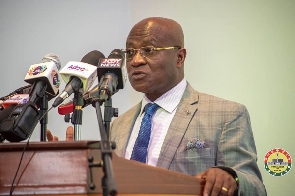Public Agenda
The Government and the Volta River Authority (VRA) have maintained a deafening silence over the fact that Ghanaians continue to subsidise the electricity Volta Aluminum Company (Valco) consumes, more than two months after the Energy Ministry said negotiations have failed.
The Ministry of Energy said in January that government would soon announce the 'consequential actions' following from the breakdown of mediation with representatives of Kaiser Aluminum and Volta Aluminum Company (Valco), its Ghanaian subsidiary.
It costs the Volta River Authority (VRA) 6.5 US cents/kWh to generate power from hydro and thermal sources combined and Ghanaians pay 7.8 US cents/kWh but Valco still pays a paltry sum of 1.1 US cents/kWh, meaning in effect that Ghanaians are subsidising Valco's consumption.
When reached for his comment on this anomaly, on Thursday March 27, then Energy Minister, Albert Kan Dapaah told Public Agenda, there was a gentleman's agreement not to comment on the matter until an agreement has been reached. He also would not say how soon an agreement would be reached.
The government in January was forthright in telling Ghanaians about the state of negotiations and the tone of the Energy Ministry's press release showed government was in no mood to compromise on the matter. It described the situation where Valco's operations were being subsidised to the detriment of the commercial viability of the VRA as "no longer tenable."
The dangerously low level of the Akosombo Dam was also a matter of concern and Valco's aluminum smelter in Tema was ordered to shut down a number of pots lines. However, after reports that Valco was going to seek arbitration in international courts over the matter, government and the VRA have gone silent and Valco's smelter still operates albeit at a reduced capacity of one pot line instead of the six.
With official silence over the matter, it is not clear how long negotiations would last and how long hard-up Ghanaians would continue to subsidise electricity consumed by Valco, the highest consumer of electricity in the country. Reports reaching Public Agenda indicate that Kaiser, which is handling the Valco negotiations with the government, is not prepared to pay more than the 1.1 US cents it currently pays.
The debate over Valco subsidy comes at a time when the International Monetary Fund (IMF) is pushing Ghana to privatise water and electricity to achieve full cost recovery in these sectors. The IMF has, however, been silent over the Valco subsidy issue.
This is not the first time government has failed to get Valco, which has been operating in Ghana for over 35 years, to pay 'realistic tariffs' for the electricity it consumes. The company's relationship with the country is not a straightforward one.
At the time the Akosombo Dam was to be constructed, Ghana's electricity consumption was not large enough to justify the foreign investment being sought. The total cost of the dam was ?60 million of which Ghana provided half.
To raise the additional half, Ghana had to show that there was an immediate demand for the power to be produced by the dam. This is where Valco came in.
Ghana's President at the time, Kwame Nkrumah, invited Edgar Kaiser of Kaiser Aluminum who brought together a consortium of aluminum interests and Valco was formed to operate an aluminum smelter.
Under the agreement, Valco guaranteed to buy half of the dam's output for a period of thirty years.
The disagreement over how much Valco should pay for electricity consumed is not new and dates as far back as the existence of the company and before the dam was built. A World Bank assessment of the project, a prerequisite for Ghana to access a World Bank loan of ?30 million for the project, estimated that for the project to be viable, Valco had to pay Ghana a guaranteed rate of 4.5 mills per kilowatt of current and all other consumers pay 15 mills per kilowatt of current.
Kaiser, however insisted on paying 2.5 mills per kilowatt of current. After intense negotiations and lobbying Kaiser got the World Bank to accept its assessment and estimates. Kaiser has always maintained that cheap electricity is a prerequisite for operating an aluminium smelter.
Valco was brought in because Ghana did not have the capacity to consume all the power it was generating. Three and half decades down the line and circumstances have changed.
The water level in the Akosombo Dam has dropped significantly, making it unwise to tap the huge supply of power Valco needs from it. The cost of generating power from the dam has increased and is more than two (2) US cents per kilowatt-hour.
Ghana's consumption of electricity has also grown, making it necessary for thermal power to be tapped in addition to hydro sources. Thermal power currently accounts for about 60 per cent of the total electricity produced in the country.
With the falling level of water in the dam, Valco has had to cut back its operations. It however still receives power, which is almost a third of what VRA produces, according to VRA sources. Valco normally consumes about 60 percent of the power generated by the Akosombo Dam.
This is how the Energy Ministry summed up the situation in its press statement in January: "Valco has failed to see the new realities and insists that power be sold to it today at rates that pretend that Ghana's power is produced exclusively from cheap hydro sources, as it was when it first started operations in Ghana about 35 years ago. The power contract between VRA and Valco, which regulates the sale of power to Valco, expired in 1997 and it has still not been possible to conclude the negotiations of new one."
Given that this situation has dragged on for sometime now, it would require strong political will to change the status quo. But government's silence takes the issue out of the public domain and this could prolong the Valco subsidy, under the guise of continued negotiations.


















